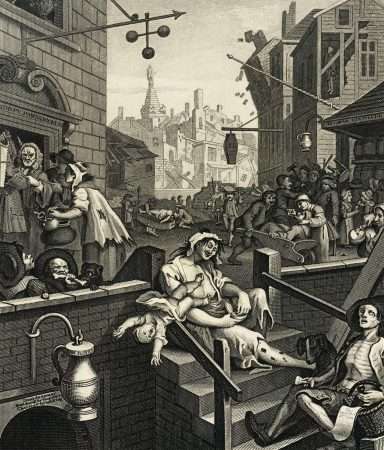Whether you’re taking a client out for dinner and wine, or enjoying a pint with colleagues after work, it seems that alcohol definitely has its place in the business world. In fact, you may feel the pressure to engage in social drinking, just to get ahead at work.
Unfortunately, when drinking becomes a regular thing, it also has the potential to turn into a problem. Perhaps you are already familiar with alcoholism in the workplace, are struggling with it yourself, or you may be working with a colleague you didn’t realise enjoys that last drink just a little too much. So if your work is starting to seem like a scene from Mad Men, it may be time to address the issue before it gets out of hand.
“Everyone Drinks at Work, Don’t They?”
Alcohol abuse in the workplace is a serious issue and is not exclusive to any occupation. However, drinking is more commonplace in certain fields than others. In fact, in certain companies or positions, alcohol at work is a normal aspect of the corporate culture.
For instance, it is common practice among certain white-collar professions. The employees involved may even believe that their careers depend on going out for drinks. In finance and sales, for example, it is normal to mingle with clients over cocktails. Those who travel a lot for business trips or conferences will often find themselves at an after-party.
Drinking at work is often a way for colleagues to bond and network, and build relationships with clients. It can also be an easy way to unwind after a stressful day. Others may use it as a performance enhancer. Young professionals today claim that it is difficult to fit in socially without drinking at work.
Alcohol abuse is common in many workplaces
People who work long hours, night shifts, strenuous jobs, or perform monotonous tasks, often engage in problematic drinking at work. Of the entire workforce, between 3-5% are alcohol dependent.
Professionals and executives are likely to drink more. but people working in blue-collar fields are more likely to engage in alcohol misuse. In addition, combining alcoholism and blue-collar in dangerous areas such as mining or construction is more likely to result in injuries or death.
About a quarter of the workforce admits to heavy drinking. In professional and financial occupations, that number rises to about a third. What’s worse is that many more confess to coming into work either hungover or drunk. Therefore, it is not surprising that up to 40% of workplace accidents can be attributed to irresponsible drinking.
Consequences of Alcoholism in the Workplace
If you have to operate heavy equipment or drive, it is obvious why drinking at work is unacceptable. However, it goes far beyond that as well.
Alcohol abuse leads to a number of problems, not only for the individual, but for their coworkers and the company as a whole. In many cases, the problems can affect the community and the economy in the long run. In the UK, it is estimated that alcohol-related issues cost the UK economy about £6.4 billion a year.
Those who abuse alcohol are likely to be less productive over time, and will often rely on sick days more than necessary. Up to 5% of sick days are reported to be related to alcohol.
Alcoholism in the workplace can wreak havoc indirectly as well. If even one employee’s work performance deteriorates, others may lose their motivation to be their best. As a result, the company morale and reputation can suffer.
When Does Drinking at Work Become a Problem?
Because we’re unlikely to see alcohol leaving the workplace any time soon, it is important to keep things under control. If the corporate culture supports, or even encourages drinking at work, it can be difficult to determine when it becomes a problem. Understanding how and when drinking creates issues can help prevent long-term consequences.
Whether looking at the big picture or an individual, the signs of alcoholism in the workplace are similar. If you are concerned about a colleague, you might look for:
- Lower productivity
- Evidence of drinking during the day (or before work)
- Heavy drinking outside work hours
- Decreased reliability
- Neglect of appearance or self-care
- Mood swings and irritability
- Signs of ongoing stress, anxiety or burnout
- Increased sensitivity to criticism
- Regular or increasing sick days and tardiness
- Increase in easy-to-avoid mistakes or involvement in accidents
If the problem hasn’t yet caused serious consequences, the signs of potential alcoholic behaviour may be hard to spot (functioning alcoholic). Sometimes, the issue covers a specific department or group of colleagues, which can lead to an even more serious situation.
Getting Help for Alcoholism in the Workplace
When alcohol is starting to interfere with business, consider talking to your manager, boss or the HR department. It can be awkward, especially if your boss is one of the people that encourages such behaviour. However, it will be better for your job and the company in the long-run.
If you think a colleague is showing signs of alcoholism, try to talk to them directly first. It can be easy to get caught up in the social drinking culture, so they may not be aware of what’s happening. Early intervention matters in such scenarios, as addiction is easier to address in the beginning. Alcoholism and addiction often go unnoticed until it becomes a crisis.
When speaking to your colleague, express concern as a colleague and friend rather than in a demeaning manner. After all, colleagues should look out for each other. Present the facts first. For example, point out how they have been taking more sick days than usual, where their productivity has decreased, or when you’ve noticed them drinking irresponsibly. In addition, it is important to highlight how their behaviour is affecting others in the company. If necessary, help them realise that they may lose their job if they don’t change.
Protect yourself from alcohol misuse in the workplace
If you notice symptoms of problematic drinking in yourself but don’t want to feel excluded, try pacing your drinks, or swapping them with mocktails. You can also order look-a-like drinks, such as a tonic and lime, instead of a gin and tonic.
You might hesitate to speak up in fear of losing your job. However, ultimately, the company has a responsibility to their employees, especially if they propagate a drinking culture. It is much better for you and the company to allow an employee to take time off for treatment than to lose them all together. Opening up can also help the company reassess their corporate culture and make appropriate changes.
Returning From Rehab
Should you or your colleague take time off for treatment, make sure there is a plan for when you return. Staying sober in a workplace where alcohol seems free-flowing can be stressful, so having support is necessary. If you have a coworker you trust, explain your situation and enlist their support.
It can also help to have some coping strategies in place. For example, will you “come out” about your problem from the start? Or should you have some alternative explanations for not drinking (e.g. I’m on a diet)? Honesty and openness is often the best policy but timing is also important.
In any case, it is important to stick to your aftercare plan, especially in the beginning. While returning back to work may seem like a priority, so is self-care. Don’t miss out on AA meetings. They can be your rock when things become hard to handle.
Of course, if you find the environment too stressful, and you feel that those in control of your workplace are unlikely to change, you should consider looking for a new position elsewhere. This is no different, in many ways, than being in a toxic relationship.
-
Related Pages on Alcohol Addiction


